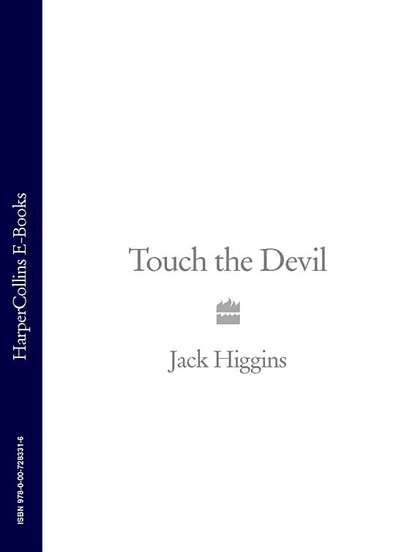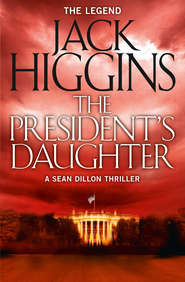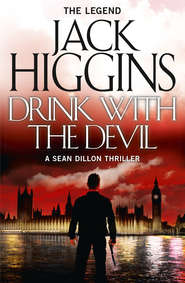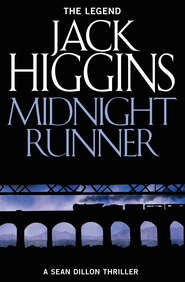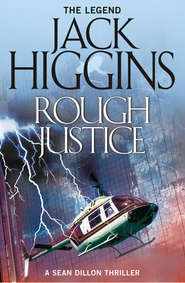По всем вопросам обращайтесь на: info@litportal.ru
(©) 2003-2024.
✖
Touch the Devil
Автор
Год написания книги
2018
Настройки чтения
Размер шрифта
Высота строк
Поля
Touch the Devil
Jack Higgins
Classic adventure from the million copy bestseller Jack HigginsIf there’s such a thing as a grade A terrorist then his name is Frank Barry. His ideology is money and his track record is flawless.When the Russians want review copies of the latest NATO missile system, Barry’s the man to deliver them.Stopping him will be near enough impossible, but one man knows all the moves. Martin Brosnan is a poet, scholar and trained killer. A graduate of Vietnam and polished in the ranks of the IRA he could be the key to ending Barry’s reign.There’s one problem, Brosnan is languishing in a French prison, and only the powerfully persuasive Liam Devlin can get him out and working for British intelligence.
JACK HIGGINS
TOUCH THE DEVIL
Contents
Title Page (#u68ec3b58-7f79-577e-b590-e7479b657845)Publisher’s Note (#u94209ef6-00c7-5929-8ccf-7d2c198c428a)Dedication (#u0737fd01-6420-5f1c-807a-7b4cf755a63d)Prologue (#u3e86dc2e-794a-5b26-9bf5-e566da77744b)Chapter One (#ue3a33894-5140-5808-aba6-cd2846777ec7)Chapter Two (#u1a5567ff-dbb7-5b97-937f-9070562687fe)Chapter Three (#u1b11b8e8-63a4-5e34-8ac2-321ca6ac2e49)Chapter Four (#u3ba6d89e-2b83-570f-8079-13dffb71f8de)Chapter Five (#litres_trial_promo)Chapter Six (#litres_trial_promo)Chapter Seven (#litres_trial_promo)Chapter Eight (#litres_trial_promo)Chapter Nine (#litres_trial_promo)Chapter Ten (#litres_trial_promo)Chapter Eleven (#litres_trial_promo)Chapter Twelve (#litres_trial_promo)Chapter Thirteen (#litres_trial_promo)Chapter Fourteen (#litres_trial_promo)Chapter Fifteen (#litres_trial_promo)Chapter Sixteen (#litres_trial_promo)About the Author (#litres_trial_promo)Also by Jack Higgins (#litres_trial_promo)Copyright (#litres_trial_promo)About the Publisher (#litres_trial_promo)
PUBLISHER’S NOTE (#u34de0702-34ff-53ad-8c88-fc6d8e712fe1)
TOUCH THE DEVIL was first published in the UK by William Collins Sons & Co Ltd in 1982 and in 1983 by Pan Books, but has been out of print for some years.
In 2008, it seemed to the author and his publishers that it was a pity to leave such a good story languishing on his shelves. So we are delighted to be able to bring back TOUCH THE DEVIL for the pleasure of the vast majority of us who never had a chance to read the earlier editions.
For Margaret Hewitt
Between two groups of men that want to make inconsistent kinds of worlds. I see no remedy except force … It seems to me that every society rests on the death of men.
Oliver Wendell Holmes
Vietnam 1968
PROLOGUE (#u34de0702-34ff-53ad-8c88-fc6d8e712fe1)
The Medevac helicopter drifted across the delta at a thousand feet, her escort a Huey Cobra gunship keeping station to the left. Rain threatened, the clouds over the jungle in the far distance heavy with it, and thunder rumbled on the distant horizon.
Inside the Medevac, Anne-Marie Audin sat in a corner, eyes closed, her back supported by a case of medical supplies. She was a small, olive-skinned girl with black hair razor-cut close to the skull, a concession to the living conditions of the Vietnam war front. She wore a camouflage jump jacket, unzipped at the front, a khaki bush shirt and pants tucked into French paratroopers’ boots. The most interesting features were the cameras, two Nikons strung around her neck by leather straps; the pouches of the jump jacket contained, not ammunition, but a variety of lenses and dozens of packets of 35 millimetre film.
The young medic squatting beside the negro Crew Chief gazed at her in frank admiration. The first two buttons of the khaki bush shirt were undone, giving a hint, no more, of the firm breasts rising and falling gently as she slept.
‘A long time since I saw anything like that,’ he said. ‘A real lady.’
‘And then some, boy.’ The Crew Chief passed him a cigarette. ‘There’s nowhere that girl hasn’t been. She even jumped with the 503rd Paras at Katum last year. You name it, she’s done it. Life magazine did an article on her six or seven months back. She’s from Paris, would you believe that? And from the kind of family that owns a large slice of the Bank of France.’
The boy’s eyes widened in amazement. ‘Then what in the hell is she doing here?’
The Crew Chief grinned. ‘Don’t ask me, kid. I don’t even know what I’m doing here.’
‘Have you a cigarette? I seem to have run out,’ Anne-Marie said.
Her eyes were greener than anything he had ever seen, the Crew Chief realised that as he tossed a pack across to her. ‘Keep them.’
She shook one out and lit it with an old brass lighter fashioned from a bullet, then closed her eyes again, the cigarette lax in her fingers. The boy had been right, of course. What was she doing here, the girl who had everything? A grandfather who doted on her, one of the richest and most powerful industrialists in France. A father who had survived Indo-China only to die in Algeria, an infantry colonel, five times decorated, Chevalier of the Legion of Honour. An authentic hero and just as dead.
Her mother had never recovered from the shock, had died in a car crash near Nice two years later. The thought often crossed Anne-Marie’s mind that perhaps it had been a deliberate turn of the wheel which had taken the Porsche over the edge of that mountain road that night.
Poor little rich girl. Her mouth twisted in a derisory smile, her eyes still closed. The houses, the villas, the servants, the good English schools, and then the Sorbonne; a year of that stifling academic atmosphere had been enough. Not forgetting the affairs, of course, and the brief flirtation with drugs.
It was the camera which had saved her. From her first Kodak at the age of eight, she had had an instinctive genius for photography, which had developed over the years into what her grandfather described as Anne-Marie’s little hobby.
After the Sorbonne, she had made it more than that. Had apprenticed herself to one of the finest fashion photographers in Paris for six months, had then joined Paris-Match as a staff photographer. Her reputation had soared astonishingly within one short year, but it was not enough – not nearly enough – and when she asked to be assigned to Vietnam, they had laughed at her.
So, she had resigned, turned freelance and in a final confrontation with her grandfather, had forced from him a promise to use all his formidable political power to obtain for her the necessary credentials from the Department of Defense. It was a new Anne-Marie he had seen that day: a girl filled with a single-minded ruthlessness which had surprised him. And yet had also filled him with reluctant admiration. Six months, he had said. Six months only, and she had promised, knowing beyond any shadow of a doubt that she would break that promise.
Which she did, for when her time was up, it was too late to turn back. She was famous, her material used by every major magazine in Europe and America. Time, Paris-Match, Life, had all clamoured for the exclusive services of this mad French girl who had jumped with the paratroopers at Katum. The girl for whom no assignment was too rough or too dangerous.
Whatever it was she was looking for, she discovered what war was about, at least in Vietnam. No set-piece battles. No trumpets in the wind, no distant drum to stir the heart. It was savage street fighting in Saigon during the Tet offensive. It was the swamps of the Mekong Delta, the jungles of the central highlands. The leg ulcers that ate their way through the bone like acid, leaving scars which would never go away.
Which brought her to today. A morning spent waiting in the rain at Pleikic trying to arrange transportation to Din To until she’d managed to thumb a lift in the Medevac. God, but she was tired – more tired than she had ever been in her life. It occurred to her, that perhaps she’d reached the end of something. She frowned slightly. And then the Crew Chief called out sharply.
He was hanging in the open doorway, pointing to where a flame had soared into the sky a few hundred yards to the east. The Medevac swung towards it and started to go down, followed by the Huey Cobra gunship.
Anne-Marie was on her feet and standing beside the Crew Chief, peering out. There was the burnt-out wreck of a helicopter in a corner of a paddy field, several bodies sprawled beside it. The man who waved frantically from the dyke was in American uniform.
The Medevac went on down, her escort circling warily, and Anne-Marie locked a lens into place on one of her Nikons and started to take pictures one after the other, braced against the Crew Chief’s shoulder.
He turned his head to smile at her once and then, when they were no more than thirty feet up, she realised, with a strange kind of detachment, that the face she was focusing on below was Vietnamese, not American. A couple of heavy machine guns opened up from the jungle fifty yards away and at that range they couldn’t miss.
The Crew Chief didn’t stand a chance, standing in the open door. Bullets hammered into him, punching him back against Anne-Marie who was hurled against the medical supplies. She pushed him to one side and got to one knee. The young medic was huddled in the corner, clutching a bloody arm and as another solid burst of machine gun fire raked the cockpit, she heard the pilot cry out.
She lurched forward, grabbing at a strut for support; at the same moment the aircraft lifted violently and she was thrown out through the open door to fall into the mud and water of the paddy field. The Medevac bucked twenty or thirty feet up in the air, veered sharply to the left and exploded in a great ball of fire, burning fuel and debris scattering like shrapnel.
Anne-Marie managed to stand, plastered with mud, and found herself facing the man on the dyke in American uniform who, she could see now, was very definitely Vietnamese. The rifle he pointed at her was a Russian AK47. Further along the dyke, half a dozen Vietcong in straw hats and black pyjamas climbed from the ditch and moved towards her.
The Huey Cobra swept in, its heavy machine guns kicking dirt along the dyke, driving the Vietcong backwards into the ditch. Anne-Marie glanced up and the gunship hovered; then forty or fifty North Vietnamese regular troops in khaki uniforms appeared from the jungle on the far side of the paddy field and started to fire at the gunship with everything they had. The gunship moved towards them, loosing off its rocket pods, and the Vietnamese beat a hasty retreat back into the jungle. The gunship turned and flew away to the south for perhaps a quarter of a mile, then proceeded to fly around the entire area in a slow circle.
Anne-Marie crouched against the dyke, trying to catch her breath, then stood up slowly. It was very quiet and she looked about her at the carnage, the burnt-out helicopter, the bodies partially covered by mud and water. There was nothing, only desolation on every hand, a great bank of reeds thirty or forty yards away. She was alone at a point of maximum danger in her life, could be saved only by the reinforcements the Huey Cobra would undoubtedly have radioed for. Until then, there was really only one thing she could do.
The Nikons around her neck were plastered with mud. She took another lens from one of the pouches in her jump jacket, and opened a fresh pack of film. She started taking pictures, moving knee-deep through the water, bodies swirling around her, feeling cold, dispassionate, totally detached. And then she turned and found three Vietcong standing fifteen or twenty yards away.
There was a moment of perfect stillness, the grave, oriental faces totally without expression. The one in the centre, a boy of fifteen or sixteen, raised his AK47 and took aim carefully and just as carefully, Anne-Marie raised her Nikon. Death, she thought. The last picture of all. A beautiful boy in black pyjamas. Above their heads, the sky rumbled its thunder, rain falling in a great solid downpour, and there was a cry, high through the rain, strangely familiar. The cry of the Samurai, unafraid and facing fearful odds.
The Vietcong started to turn. Behind them a man erupted from the tall reeds, plunging towards them in a kind of slow motion. Khaki sweatband around his head, camouflage jump jacket festooned with grenades, the M16 rifle in his hands already firing, mouth wide in that savage cry.
She swung the camera in a reflex, kept on filming as he fired from the hip, knocking out one, then two, the M16 emptying as he reached the boy who still fired stubbornly, wide to one side. The butt of the M16 swung in a bone-crushing arc, the boy went down. Her rescuer didn’t even bother to reload, simply grabbed her hand, turned and started to plough back towards the reeds, churning water.
There were voices behind them on the dyke now and more shooting. It was as if she were kicked in the left leg, no more than that, and she went down again. He turned, ramming a clip into the M16, raking the dyke with fire, and he was laughing, that was the terrible thing as she tried to stand and looked up at him. When he reached down and pulled her up, she was aware of an energy, an elemental force such as she had never known. And then she was on her feet and they were into the safety of the reeds.
He had her up on a small mudbank out of the water as he sliced open her khaki pants with a knife and checked the wound.
‘You’re lucky,’ he said. ‘Straight through. M1 from the look of it. An AK would have fragmented the bone.’
He expertly strapped a field dressing around the wound, broke open a morphine ampoule and jabbed it into her. ‘You’re going to need that. A gunshot wound never hurts at first. Too much shock. The pain comes later.’
‘First-hand experience?’
Jack Higgins
Classic adventure from the million copy bestseller Jack HigginsIf there’s such a thing as a grade A terrorist then his name is Frank Barry. His ideology is money and his track record is flawless.When the Russians want review copies of the latest NATO missile system, Barry’s the man to deliver them.Stopping him will be near enough impossible, but one man knows all the moves. Martin Brosnan is a poet, scholar and trained killer. A graduate of Vietnam and polished in the ranks of the IRA he could be the key to ending Barry’s reign.There’s one problem, Brosnan is languishing in a French prison, and only the powerfully persuasive Liam Devlin can get him out and working for British intelligence.
JACK HIGGINS
TOUCH THE DEVIL
Contents
Title Page (#u68ec3b58-7f79-577e-b590-e7479b657845)Publisher’s Note (#u94209ef6-00c7-5929-8ccf-7d2c198c428a)Dedication (#u0737fd01-6420-5f1c-807a-7b4cf755a63d)Prologue (#u3e86dc2e-794a-5b26-9bf5-e566da77744b)Chapter One (#ue3a33894-5140-5808-aba6-cd2846777ec7)Chapter Two (#u1a5567ff-dbb7-5b97-937f-9070562687fe)Chapter Three (#u1b11b8e8-63a4-5e34-8ac2-321ca6ac2e49)Chapter Four (#u3ba6d89e-2b83-570f-8079-13dffb71f8de)Chapter Five (#litres_trial_promo)Chapter Six (#litres_trial_promo)Chapter Seven (#litres_trial_promo)Chapter Eight (#litres_trial_promo)Chapter Nine (#litres_trial_promo)Chapter Ten (#litres_trial_promo)Chapter Eleven (#litres_trial_promo)Chapter Twelve (#litres_trial_promo)Chapter Thirteen (#litres_trial_promo)Chapter Fourteen (#litres_trial_promo)Chapter Fifteen (#litres_trial_promo)Chapter Sixteen (#litres_trial_promo)About the Author (#litres_trial_promo)Also by Jack Higgins (#litres_trial_promo)Copyright (#litres_trial_promo)About the Publisher (#litres_trial_promo)
PUBLISHER’S NOTE (#u34de0702-34ff-53ad-8c88-fc6d8e712fe1)
TOUCH THE DEVIL was first published in the UK by William Collins Sons & Co Ltd in 1982 and in 1983 by Pan Books, but has been out of print for some years.
In 2008, it seemed to the author and his publishers that it was a pity to leave such a good story languishing on his shelves. So we are delighted to be able to bring back TOUCH THE DEVIL for the pleasure of the vast majority of us who never had a chance to read the earlier editions.
For Margaret Hewitt
Between two groups of men that want to make inconsistent kinds of worlds. I see no remedy except force … It seems to me that every society rests on the death of men.
Oliver Wendell Holmes
Vietnam 1968
PROLOGUE (#u34de0702-34ff-53ad-8c88-fc6d8e712fe1)
The Medevac helicopter drifted across the delta at a thousand feet, her escort a Huey Cobra gunship keeping station to the left. Rain threatened, the clouds over the jungle in the far distance heavy with it, and thunder rumbled on the distant horizon.
Inside the Medevac, Anne-Marie Audin sat in a corner, eyes closed, her back supported by a case of medical supplies. She was a small, olive-skinned girl with black hair razor-cut close to the skull, a concession to the living conditions of the Vietnam war front. She wore a camouflage jump jacket, unzipped at the front, a khaki bush shirt and pants tucked into French paratroopers’ boots. The most interesting features were the cameras, two Nikons strung around her neck by leather straps; the pouches of the jump jacket contained, not ammunition, but a variety of lenses and dozens of packets of 35 millimetre film.
The young medic squatting beside the negro Crew Chief gazed at her in frank admiration. The first two buttons of the khaki bush shirt were undone, giving a hint, no more, of the firm breasts rising and falling gently as she slept.
‘A long time since I saw anything like that,’ he said. ‘A real lady.’
‘And then some, boy.’ The Crew Chief passed him a cigarette. ‘There’s nowhere that girl hasn’t been. She even jumped with the 503rd Paras at Katum last year. You name it, she’s done it. Life magazine did an article on her six or seven months back. She’s from Paris, would you believe that? And from the kind of family that owns a large slice of the Bank of France.’
The boy’s eyes widened in amazement. ‘Then what in the hell is she doing here?’
The Crew Chief grinned. ‘Don’t ask me, kid. I don’t even know what I’m doing here.’
‘Have you a cigarette? I seem to have run out,’ Anne-Marie said.
Her eyes were greener than anything he had ever seen, the Crew Chief realised that as he tossed a pack across to her. ‘Keep them.’
She shook one out and lit it with an old brass lighter fashioned from a bullet, then closed her eyes again, the cigarette lax in her fingers. The boy had been right, of course. What was she doing here, the girl who had everything? A grandfather who doted on her, one of the richest and most powerful industrialists in France. A father who had survived Indo-China only to die in Algeria, an infantry colonel, five times decorated, Chevalier of the Legion of Honour. An authentic hero and just as dead.
Her mother had never recovered from the shock, had died in a car crash near Nice two years later. The thought often crossed Anne-Marie’s mind that perhaps it had been a deliberate turn of the wheel which had taken the Porsche over the edge of that mountain road that night.
Poor little rich girl. Her mouth twisted in a derisory smile, her eyes still closed. The houses, the villas, the servants, the good English schools, and then the Sorbonne; a year of that stifling academic atmosphere had been enough. Not forgetting the affairs, of course, and the brief flirtation with drugs.
It was the camera which had saved her. From her first Kodak at the age of eight, she had had an instinctive genius for photography, which had developed over the years into what her grandfather described as Anne-Marie’s little hobby.
After the Sorbonne, she had made it more than that. Had apprenticed herself to one of the finest fashion photographers in Paris for six months, had then joined Paris-Match as a staff photographer. Her reputation had soared astonishingly within one short year, but it was not enough – not nearly enough – and when she asked to be assigned to Vietnam, they had laughed at her.
So, she had resigned, turned freelance and in a final confrontation with her grandfather, had forced from him a promise to use all his formidable political power to obtain for her the necessary credentials from the Department of Defense. It was a new Anne-Marie he had seen that day: a girl filled with a single-minded ruthlessness which had surprised him. And yet had also filled him with reluctant admiration. Six months, he had said. Six months only, and she had promised, knowing beyond any shadow of a doubt that she would break that promise.
Which she did, for when her time was up, it was too late to turn back. She was famous, her material used by every major magazine in Europe and America. Time, Paris-Match, Life, had all clamoured for the exclusive services of this mad French girl who had jumped with the paratroopers at Katum. The girl for whom no assignment was too rough or too dangerous.
Whatever it was she was looking for, she discovered what war was about, at least in Vietnam. No set-piece battles. No trumpets in the wind, no distant drum to stir the heart. It was savage street fighting in Saigon during the Tet offensive. It was the swamps of the Mekong Delta, the jungles of the central highlands. The leg ulcers that ate their way through the bone like acid, leaving scars which would never go away.
Which brought her to today. A morning spent waiting in the rain at Pleikic trying to arrange transportation to Din To until she’d managed to thumb a lift in the Medevac. God, but she was tired – more tired than she had ever been in her life. It occurred to her, that perhaps she’d reached the end of something. She frowned slightly. And then the Crew Chief called out sharply.
He was hanging in the open doorway, pointing to where a flame had soared into the sky a few hundred yards to the east. The Medevac swung towards it and started to go down, followed by the Huey Cobra gunship.
Anne-Marie was on her feet and standing beside the Crew Chief, peering out. There was the burnt-out wreck of a helicopter in a corner of a paddy field, several bodies sprawled beside it. The man who waved frantically from the dyke was in American uniform.
The Medevac went on down, her escort circling warily, and Anne-Marie locked a lens into place on one of her Nikons and started to take pictures one after the other, braced against the Crew Chief’s shoulder.
He turned his head to smile at her once and then, when they were no more than thirty feet up, she realised, with a strange kind of detachment, that the face she was focusing on below was Vietnamese, not American. A couple of heavy machine guns opened up from the jungle fifty yards away and at that range they couldn’t miss.
The Crew Chief didn’t stand a chance, standing in the open door. Bullets hammered into him, punching him back against Anne-Marie who was hurled against the medical supplies. She pushed him to one side and got to one knee. The young medic was huddled in the corner, clutching a bloody arm and as another solid burst of machine gun fire raked the cockpit, she heard the pilot cry out.
She lurched forward, grabbing at a strut for support; at the same moment the aircraft lifted violently and she was thrown out through the open door to fall into the mud and water of the paddy field. The Medevac bucked twenty or thirty feet up in the air, veered sharply to the left and exploded in a great ball of fire, burning fuel and debris scattering like shrapnel.
Anne-Marie managed to stand, plastered with mud, and found herself facing the man on the dyke in American uniform who, she could see now, was very definitely Vietnamese. The rifle he pointed at her was a Russian AK47. Further along the dyke, half a dozen Vietcong in straw hats and black pyjamas climbed from the ditch and moved towards her.
The Huey Cobra swept in, its heavy machine guns kicking dirt along the dyke, driving the Vietcong backwards into the ditch. Anne-Marie glanced up and the gunship hovered; then forty or fifty North Vietnamese regular troops in khaki uniforms appeared from the jungle on the far side of the paddy field and started to fire at the gunship with everything they had. The gunship moved towards them, loosing off its rocket pods, and the Vietnamese beat a hasty retreat back into the jungle. The gunship turned and flew away to the south for perhaps a quarter of a mile, then proceeded to fly around the entire area in a slow circle.
Anne-Marie crouched against the dyke, trying to catch her breath, then stood up slowly. It was very quiet and she looked about her at the carnage, the burnt-out helicopter, the bodies partially covered by mud and water. There was nothing, only desolation on every hand, a great bank of reeds thirty or forty yards away. She was alone at a point of maximum danger in her life, could be saved only by the reinforcements the Huey Cobra would undoubtedly have radioed for. Until then, there was really only one thing she could do.
The Nikons around her neck were plastered with mud. She took another lens from one of the pouches in her jump jacket, and opened a fresh pack of film. She started taking pictures, moving knee-deep through the water, bodies swirling around her, feeling cold, dispassionate, totally detached. And then she turned and found three Vietcong standing fifteen or twenty yards away.
There was a moment of perfect stillness, the grave, oriental faces totally without expression. The one in the centre, a boy of fifteen or sixteen, raised his AK47 and took aim carefully and just as carefully, Anne-Marie raised her Nikon. Death, she thought. The last picture of all. A beautiful boy in black pyjamas. Above their heads, the sky rumbled its thunder, rain falling in a great solid downpour, and there was a cry, high through the rain, strangely familiar. The cry of the Samurai, unafraid and facing fearful odds.
The Vietcong started to turn. Behind them a man erupted from the tall reeds, plunging towards them in a kind of slow motion. Khaki sweatband around his head, camouflage jump jacket festooned with grenades, the M16 rifle in his hands already firing, mouth wide in that savage cry.
She swung the camera in a reflex, kept on filming as he fired from the hip, knocking out one, then two, the M16 emptying as he reached the boy who still fired stubbornly, wide to one side. The butt of the M16 swung in a bone-crushing arc, the boy went down. Her rescuer didn’t even bother to reload, simply grabbed her hand, turned and started to plough back towards the reeds, churning water.
There were voices behind them on the dyke now and more shooting. It was as if she were kicked in the left leg, no more than that, and she went down again. He turned, ramming a clip into the M16, raking the dyke with fire, and he was laughing, that was the terrible thing as she tried to stand and looked up at him. When he reached down and pulled her up, she was aware of an energy, an elemental force such as she had never known. And then she was on her feet and they were into the safety of the reeds.
He had her up on a small mudbank out of the water as he sliced open her khaki pants with a knife and checked the wound.
‘You’re lucky,’ he said. ‘Straight through. M1 from the look of it. An AK would have fragmented the bone.’
He expertly strapped a field dressing around the wound, broke open a morphine ampoule and jabbed it into her. ‘You’re going to need that. A gunshot wound never hurts at first. Too much shock. The pain comes later.’
‘First-hand experience?’





